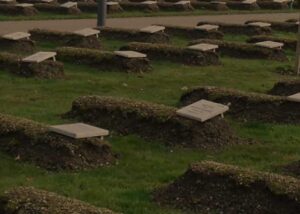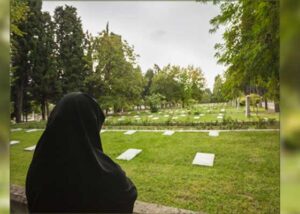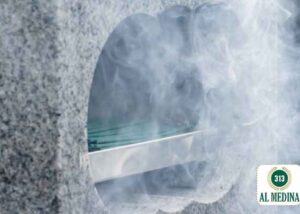I heard that it is wrong to write on graves. How can that be the case when everyone does it?
Quran
Hadith
Islamic Text
Just because people in a particular place do something, it does not make it acceptable. Even if most people everywhere were to do something that contradicts Quran and Sunnah it would be prohibited. Writing upon graves is permitted for identification purposes only. Anything beyond that, is prohibited.
عَنْ جَابِرٍ قَالَ: نَهَى النَّبِيُّ صَلَّى اللَّهُ عَلَيْهِ وَسَلَّمَ أَنْ تُجَصَّصَ القُبُورُ، وَأَنْ يُكْتَبَ عَلَيْهَا، وَأَنْ يُبْنَى عَلَيْهَا، وَأَنْ تُوطَأَ. هَذَا حَدِيثٌ حَسَنٌ صَحِيحٌ
(Sayidina) Jabir narrated that the Prophet ﷺ prohibited plastering graves, writing on them, building over them, and treading on them. (Tirmidhi 1052, Hasan Sahih).
There are similar narrations prohibiting writing upon graves in al-Nasai (2027) and Abu Dawood (3226). Imam al-Nawawi commented on the narration in Abi Dawood:
وَوَقَعَ فِي التِّرْمِذِيِّ بِزِيَادَةِ ” يُكْتَبَ عليه وأن يوطأ ” وقال حديث حسن وَوَقَعَ فِي سُنَنِ أَبِي دَاوُد زِيَادَةٌ وَأَنْ يُزَادَ عَلَيْهِ وَإِسْنَادُهَا صَحِيحٌ. (المجموع شرح المهذب)
It has been mentioned in Tirmidhi with the addition of the wording, ‘writing on them, and treading on them. He said it is a Hasan Hadith. And it has been mentioned in Sunan Abi Dawood with the addition of, ‘and increasing the height.’ The chain is Sahih. (Imam Abu Zakariyah al-Nawawi, al-Majmoo).
Due to these authentic Hadith narrations it is prohibited to write upon a grave. This is the general established rule. Numerous authoritative Hanafi scholars mentioned this ruling in their books. The fact that many Hanafis do not practice this ruling, does not undermine the ruling. Rather it highlights a shortcoming on their part.
وَعَن أبي يُوسُف أَنه قَالَ أكره أَن يكْتب عَلَيْهِ لما رُوِيَ عَن النَّبِي عَلَيْهِ السَّلَام أَنه نهى عَن تربيع الْقُبُور وَعَن تجصيصها وَعَن الْكِتَابَة عَلَيْهَا. (تحفة الفقهاء)
It is narrated from (Imam) Abu Yusuf that he said, I consider it Makruh (disliked) to write upon it (a grave). This is due to what has been narrated from the Prophet ﷺ that he prohibited squaring graves, plastering them, and writing upon them. (Imam Ala al-Deen al-Samarqandi, Tuhfatu al-Fuqaha).
وَكَرِهَ أَبُو يُوسُفَ الْكِتَابَةَ عَلَيْهِ ذَكَرَهُ الْكَرْخِيُّ لِمَا رُوِيَ عَنْ جَابِرِ بْنِ عَبْدِ اللَّهِ عَنْ النَّبِيِّ – صَلَّى اللَّهُ عَلَيْهِ وَسَلَّمَ – أَنَّهُ قَالَ: «لَا تُجَصِّصُوا الْقُبُورَ وَلَا تَبْنُوا عَلَيْهَا وَلَا تَقْعُدُوا وَلَا تَكْتُبُوا عَلَيْهَا»؛ وَلِأَنَّ ذَلِكَ مِنْ بَابِ الزِّينَةِ وَلَا حَاجَةَ بِالْمَيِّتِ إلَيْهَا؛ وَلِأَنَّهُ تَضْيِيعُ الْمَالِ بِلَا فَائِدَةٍ فَكَانَ مَكْرُوهًا. (بدائع الصنائع في ترتيب الشرائع)
(Imam) Abu Yusuf considered it Makruh (disliked) to write upon it (a grave), as mentioned by (Imam) al-Karkhi. This is due to that which was narrated by (Sayidina) Jabir bin Abdillah that the Prophet ﷺ said, ‘Do not plaster graves. Do not build upon them. Do not sit or write on them.’ Also, due to this being done for adornment. Since the deceased is not in need of adornment. As well as the fact that it is a waste of wealth without benefit. Therefore, it is Makruh (disliked). (Imam Ala al-Deen al-Kaasaani, Badai al-Sanai).
وعن أبي يوسف أنه كره أن يكتب عليه كتاباً. (المحيط البرهاني في الفقه النعماني)
(Imam) Abu Yusuf considered it Makruh (disliked) to write upon it (a grave). (Imam Burhan al-Deen al-Bukhari, al-Muheet al-Burhaani).
وَيَكْرَهُ أَنْ يُبْنَى عَلَى الْقَبْرِ أَوْ يُقْعَدَ عَلَيْهِ أَوْ يَنَامَ عَلَيْهِ أَوْ يُوطَأَ عَلَيْهِ أَوْ يُقْضَى عَلَيْهِ حَاجَةُ الْإِنْسَانِ مِنْ بَوْلٍ أَوْ غَائِطٍ أَوْ يُعَلَّمَ بِعَلَامَةٍ مِنْ كِتَابَةٍ وَنَحْوِهِ أَوْ يُصَلَّى إلَيْهِ أَوْ يُصَلَّى بَيْنَ الْقُبُورِ لِحَدِيثِ جَابِرٍ. (تبيين الحقائق شرح كنز الدقائق)
And it is Makruh (disliked) to build upon a grave, or sit upon it, or sleep upon it, or step on it, or relieve oneself upon it. Whether that be urination or defecation. Or mark it with something, like writing. Or to pray facing it, or to pray between graves. This is due to the Hadith of (Sayidina) Jabir. (Imam Fakhr al-Deen al-Zayla’i, Tabyeen al-Haqaaiq Sharh Kanz al-Daqaiq).
وكره أبو يوسف أن يكتب عليه. (البناية شرح الهداية)
(Imam) Abu Yusuf considered it Makruh (disliked) to write upon it (a grave). (Imam Badr al-Deen al-Ayni, al-Binayah Sharh al-Hidaayah).
يُكْرَهُ كِتَابَةُ اسْمِ اللَّهِ وَرَسُولِهِ وَالْقُرْآنِ عَلَى الْقَبْر. (مرقاة المفاتيح)
It is Makruh to write the name of Allah (Most High) or His Messenger ﷺ or anything from the Holy Quran on the grave. (Imam Ali al-Qari, Mirqaat al-Mafateeh).
وَيُكْرَهُ أَنْ يُبْنَى عَلَى الْقَبْرِ أَوْ يُقْعَدَ أَوْ يُنَامَ عَلَيْهِ أَوْ يُوطَأَ عَلَيْهِ أَوْ تُقْضَى حَاجَةُ الْإِنْسَانِ مِنْ بَوْلٍ أَوْ غَائِطٍ أَوْ يُعَلَّمَ بِعَلَامَةٍ مِنْ كِتَابَةٍ وَنَحْوِهِ، كَذَا فِي التَّبْيِينِ. (الفتاوى الهندية)
And it is Makruh (disliked) to build upon a grave, or sit upon it, or sleep upon it, or step on it, or relieve oneself upon it. Whether that be urination or defecation. Or mark it with something, like writing. This was mentioned in al-Tabyeen. (Fatawaa al-Hindiyah).
As we see from the evidence and Nusoos (texts) above, it is generally prohibited to write upon graves. However, the following Hadith narration states that the Holy Prophet ﷺ marked a grave for identification. Therefore, an exception is made to the general prohibition for identification purposes.
عَنْ كَثِيرِ بْنِ زَيْدٍ الْمَدَنِيِّ، عَنِ الْمُطَّلِبِ، قَالَ: لَمَّا مَاتَ عُثْمَانُ بْنُ مَظْعُونٍ، أُخْرِجَ بِجَنَازَتِهِ فَدُفِنَ، فَأَمَرَ النَّبِيُّ صَلَّى اللهُ عَلَيْهِ وَسَلَّمَ رَجُلًا أَنْ يَأْتِيَهُ بِحَجَرٍ، فَلَمْ يَسْتَطِعْ حَمْلَهُ، فَقَامَ إِلَيْهَا رَسُولُ اللَّهِ صَلَّى اللهُ عَلَيْهِ وَسَلَّمَ، وَحَسَرَ عَنْ ذِرَاعَيْهِ، قَالَ كَثِيرٌ: قَالَ الْمُطَّلِبُ: قَالَ الَّذِي يُخْبِرُنِي ذَلِكَ: عَنْ رَسُولِ اللَّهِ صَلَّى اللهُ عَلَيْهِ وَسَلَّمَ، قَالَ: كَأَنِّي أَنْظُرُ إِلَى بَيَاضِ ذِرَاعَيْ رَسُولِ اللَّهِ صَلَّى اللهُ عَلَيْهِ وَسَلَّمَ، حِينَ حَسَرَ عَنْهُمَا ثُمَّ حَمَلَهَا فَوَضَعَهَا عِنْدَ رَأْسِهِ، وَقَالَ: أَتَعَلَّمُ بِهَا قَبْرَ أَخِي، وَأَدْفِنُ إِلَيْهِ مَنْ مَاتَ مِنْ أَهْلِي
Katheer bin Zayd al-Madani narrated from al-Muttalib, who said that when (Sayidina) Uthman bin Madh’un died, he was brought out on his bier and buried. The Prophet ﷺ commanded a man to bring him a stone, but he was unable to carry it. So the Messenger of Allah ﷺ got up and, going over to it, rolled up his sleeves. Al-Muttalib remarked, that the one who narrated this to me about the Messenger of Allah ﷺ said, ‘It is as if I see the whiteness of the forearms of the Messenger of Allah ﷺ when he rolled up his sleeves and carried it until he placed it at his head.’ He ﷺ said, ‘By it I will recognise the grave of my brother. And I shall bury beside him those of my family who die.’ (Abu Dawood, 3206).
رَوَاهُ أَبُو دَاوُد بِإِسْنَاد حسن، وَهُوَ مُتَّصِل لَيْسَ مُرْسلا، لِأَن الْمطلب بَين فِي كَلَامه أَنه أخبرهُ بِهِ صَحَابِيّ حضر الْقِصَّة، وَالصَّحَابَة كلهم عدُول. (خلاصة الأحكام)
(Imam) Abu Dawood narrated it with a Hasan chain. It (the chain) is connected (Muttasil), not severed (Mursal). This is because al-Mutalib clarified that a Sahabi who was present narrated to him. And the Sahabah are all trustworthy. (Imam Yahya bin Sharaf al-Nawawi, Khulasatu al-Ahkaam).
Due to the above Hadith narration, Hanafi scholars mentioned that writing is permitted for identification purposes. Therefore, nothing more than essential information should be written. It is not permitted to write verses of the Holy Quran, Dhikr or anything else. Only that which assists in identification is permitted.
وَفِي الظَّهِيرِيَّةِ، وَلَوْ وُضِعَ عَلَيْهِ شَيْءٌ مِنْ الْأَشْجَارِ أَوْ كُتِبَ عَلَيْهِ شَيْءٌ فَلَا بَأْسَ بِهِ عِنْدَ الْبَعْضِ اهـ. وَالْحَدِيثُ الْمُتَقَدِّمُ يَمْنَعُ الْكِتَابَة فَلْيَكُنْ الْمُعَوَّلَ عَلَيْهِ لَكِنْ فَصَّلَ فِي الْمُحِيطِ فَقَالَ: وَإِنْ اُحْتِيجَ إلَى الْكِتَابَةِ حَتَّى لَا يَذْهَبَ الْأَثَرُ وَلَا يُمْتَهَنُ فَلَا بَأْسَ بِهِ فَأَمَّا الْكِتَابَةُ مِنْ غَيْرِ عُذْرٍ فَلَا اهـ. (البحر الرائق شرح كنز الدقائق)
In al-Dhaheeriyah (he mentioned), if he plants something upon it, or writes something on it, then there is no harm according to some. However, the Hadith that was mentioned prohibits writing. Therefore, it must be acted upon. In al-Muheet he explained saying, if there is a need to write so that the traces do not disappear, and it is not disrespected then there is no harm (in doing so). As for writing without a validating reason, it is not permitted. (Imam Zayn al-Deen Ibn Nujaym, al-Bahr al-Raiq).
ولا بأس بالكتابة عليه لئلا يذهب الأثر ولا يمتهن. (نور الإيضاح)
There is no harm in writing upon it, so that the traces do not disappear and to prevent disrespect. (Imam al-Shurunbulali, Nur al-Idaah).
Although Imam al-Shurunbulali alluded to the fact that writing is only permitted to mark the grave, the commentator (Imam al-Tahtawi) highlighted and emphasised this point. So that people do not misunderstand and think that it is generally permitted to write on graves.
قوله: “ولا بأس أيضا بالكتابة” قال في البحر الحديث المتقدم يمنع الكتابة فليكن هو المعول عليه لكن فصل في المحيط فقال إن احتيج إلى الكتابة حتى لا يذهب الأثر ولا يمتهن به جازت فأما الكتابة من غير عذر فلا اهـ. (حاشية الطحطاوي على مراقي الفلاح شرح نور الإيضاح)
His saying: There is also no harm in writing upon it. In al-Bahr he (Ibn Nujaym) said, the Hadith that was mentioned prohibits writing. Therefore, it must be acted upon. However, in al-Muheet he explained saying, if there is a need to write so that the traces do not disappear, and it is not disrespected then there is no harm (in doing so). As for writing without a validating reason, it is not permitted. (Imam Ahmad bin Muhammad al-Tahtawi, Haashiyah Tahtawi ala Maraaqi al-Falah).
فَإِنَّ الْكِتَابَةَ طَرِيقٌ إلَى تَعَرُّفِ الْقَبْرِ بِهَا، نَعَمْ يَظْهَرُ أَنَّ مَحَلَّ هَذَا الْإِجْمَاعِ الْعَمَلِيِّ عَلَى الرُّخْصَةِ فِيهَا مَا إذَا كَانَتْ الْحَاجَةُ دَاعِيَةً إلَيْهِ فِي الْجُمْلَةِ كَمَا أَشَارَ إلَيْهِ فِي الْمُحِيطِ بِقَوْلِهِ وَإِنْ اُحْتِيجَ إلَى الْكِتَابَةِ، حَتَّى لَا يَذْهَبَ الْأَثَرُ وَلَا يُمْتَهَنَ فَلَا بَأْسَ بِهِ. فَأَمَّا الْكِتَابَةُ بِغَيْرِ عُذْرٍ فَلَا اهـ حَتَّى إنَّهُ يُكْرَهُ كِتَابَةُ شَيْءٍ عَلَيْهِ مِنْ الْقُرْآنِ أَوْ الشِّعْرِ أَوْ إطْرَاءِ مَدْحٍ لَهُ وَنَحْوِ ذَلِكَ حِلْيَةٌ مُلَخَّصًا. (رد المحتار على الدر المختار)
Indeed, writing is a means to recognising a grave. There is a practical consensus supporting the dispensation when there is a general need for it. He alluded to this in al-Muheet, when he said: If there is a need to write so that the traces do not disappear, and it is not disrespected then there is no harm (in doing so). As for writing without a validating reason, it is not permitted. Therefore, it is Makruh (disliked) to write anything from the Holy Quran, poetry, praise of him or the like. From Hilyah, abridged. (Imam Ibn Abideen, Radd al-Muhtaar).
In the text above, there is a claim of Ijma (consensus), Imam Ibn Abideen raised a concern regarding the accuracy of this claim. This is due to the fact that many claims of absolute consensus are not upheld.
لَكِنْ نَازَعَ بَعْضُ الْمُحَقِّقِينَ مِنْ الشَّافِعِيَّة فِي هَذَا الْإِجْمَاعِ بِأَنَّهُ أَكْثَرِيٌّ، وَإِنْ سَلِمَ فَمَحَلُّ حُجِّيَّتِهِ عِنْدَ صَلَاحِ الْأَزْمِنَةِ بِحَيْثُ يَنْفُذُ فِيهَا الْأَمْرُ بِالْمَعْرُوفِ وَالنَّهْيُ عَنْ الْمُنْكَرِ، وَقَدْ تَعَطَّلَ ذَلِكَ مُنْذُ أَزْمِنَةٍ، أَلَا تَرَى أَنَّ الْبِنَاءَ عَلَى قُبُورِهِمْ فِي الْمَقَابِرِ الْمُسَبَّلَةِ أَكْثَرُ مِنْ الْكِتَابَةِ عَلَيْهَا كَمَا هُوَ مُشَاهَدٌ، وَقَدْ عَلِمُوا بِالنَّهْيِ عَنْهُ فَكَذَا الْكِتَابَةُ اهـ فَالْأَحْسَنُ التَّمَسُّكُ بِمَا يُفِيدُ حَمْلَ النَّهْيِ عَلَى عَدَمِ الْحَاجَةِ كَمَا مَرَّ. (رد المحتار على الدر المختار)
However, some of the scholars of verification from the Shafis disputed the claim of consensus. They contested that there is a majority (not an absolute consensus). Even if we accept it, then it is only a type of proof if it occurs in the era in which enjoining good and forbidding evil was upheld. That has been absent for a long time. Can you not see that building upon the graves in the endowed graveyards is even more widespread than writing? This is observable. Indeed they know that it (building upon graves) is prohibited, likewise writing (upon graves is prohibited). Therefore, it is best to consider the prohibition to be related to that for which there is no need. As has been mentioned. (Imam Ibn Abideen, Radd al-Muhtaar).
As well as the prohibition in the Hadith, one should also consider the issue of respect (Adab) for the name of Allah (Most High) and Quranic verses. When people put Quranic verses or the Name of Allah (Most High) on a gravestone, they are exposing them to wild animals that come to the graveyards at night. Sometimes, these animals may defecate or urinate close to the gravestone. At other times they may approach or even lick the gravestone itself.
No believer would want to expose the Name of Allah (Most High) or the Quranic verses to such disrespect. So why do people do it? Why do they give preference to culture and the views of people over the blessed Hadith of our beloved Prophet ﷺ, and the respect due to the Name of Allah (Most High)?
And Allah Most High Knows Best.
– Answered by Shaykh Noorud-deen Rashid (04.04.2023)






